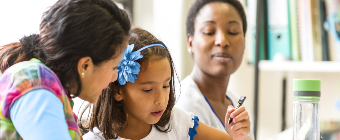With its International Youth Work (IJA), the Internationaler Bund (IB) has been taking care for young people over years. This puts the IB - as in other areas - in line with the UN's Sustainable Development Goals (SDGs), especially SDG 3: Good health and well-being. This has also become more difficult with the Corona crisis - many social services have been eliminated while many young people suffer from mental health problems. How institutions can deal with their poor condition has been investigated by experts from the IB as part of a European project.
The pandemic changed a lot - for young people in particular it was a major psychological burden. The effects are still being felt today: Many of them withdraw, have little motivation to learn, and for some the inner stress also manifests itself in aggressive behaviour. According to the German Federal Chamber of Psychotherapists, almost one in five people under the age of 18 develops a mental disorder within a year.
Experts from the IB and colleagues from other German institutions, as well as from Greece, Italy, the Netherlands and Austria have dealt with this topic within the framework of the European project "MHYT - Mental Health Youth Transition" funded by Erasmus+Youth. Their questions were, among others: “What are the challenges of young people? How can professionals in the institutions deal with them?”.
The adolescents themselves cited loneliness, reduced self-confidence, lack of physical activity and social withdrawal as the most common stressors they experience. It was challenging for professionals to identify whether young people had tangible mental health problems and how to help them with them.
Attempts were also made to find approaches that could be used to improve the young people's well-being at a low level. A variety of methods were used: from family games, meditation and photo book creation to the so-called "warm shower" - i.e. being given kind words about oneself by a group.
An important general finding was that mental health problems are still a taboo today and that young people and professionals alike could do with resilience training.
More findings and information from the project can be found here:
https://padlet.com/YES_IR/mhyt-documentation-of-activities-final-report-2023-spyul7xrney2rpw4
Project partners:
Sozialkritischer Arbeitskreis Darmstadt e. V. (Coordinator), www.ska-Darmstadt.de
IEKEP , Griechenland, www.iekep.gr
Zefiro Società Cooperativa Sociale, Italien, www.cooperativazefiro.it
Jongerenwerk Barkema en de Haan, Niederlanden, www.jongerenwerk.com
ÖJAB, Österreich, www.oejab.at
For those interested in more detail about the methods used, more information can be found here:




